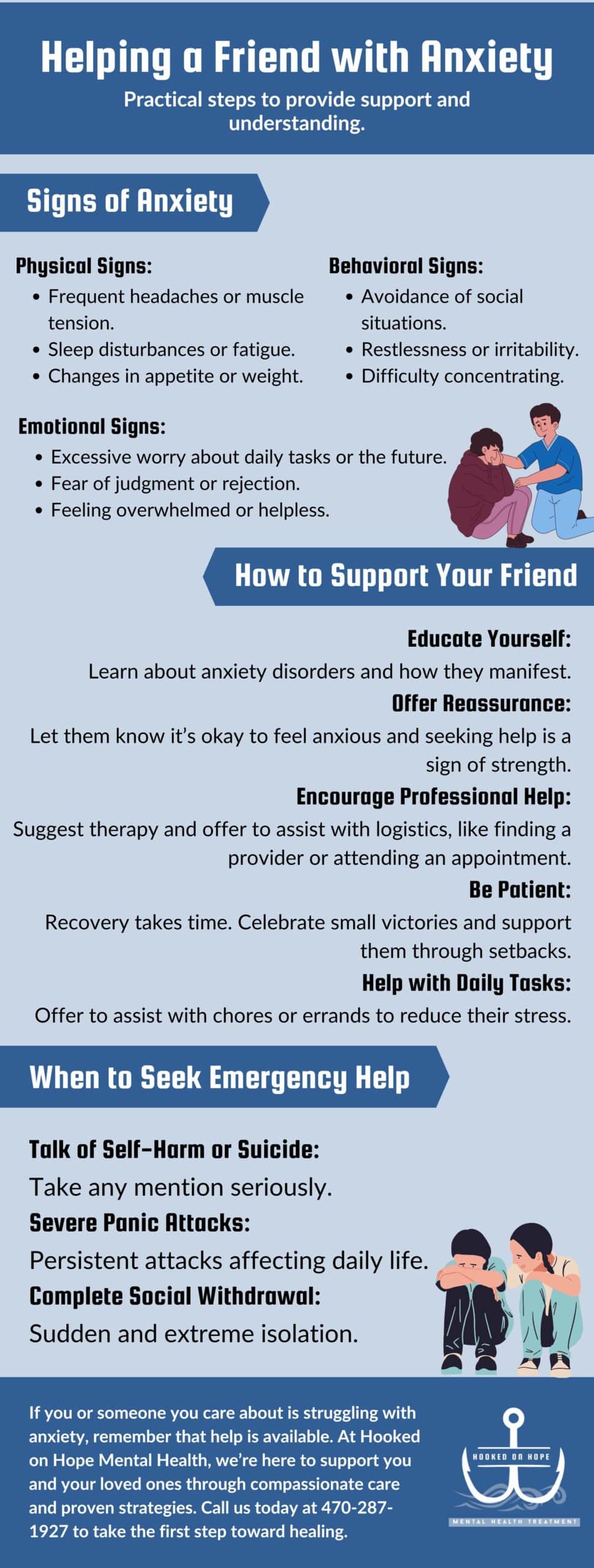Anxiety is a common mental health condition that affects millions of people worldwide, including those in Atlanta, GA. If you have a friend struggling with anxiety issues, it can be challenging to know how to provide the support they need. At Hooked on Hope Mental Health, we understand the complexities of anxiety and the importance of a supportive network. This guide offers practical steps to help you support a friend dealing with anxiety, fostering a compassionate and understanding environment that encourages healing and resilience.
What is Anxiety?
Before you can effectively help a friend with anxiety issues, it’s essential to understand what anxiety is and how it manifests. Anxiety is more than just feeling stressed or worried; it’s a persistent condition that can interfere with daily life. Common symptoms include excessive worry, restlessness, fatigue, difficulty concentrating, irritability, muscle tension, and sleep disturbances. In severe cases, anxiety can lead to panic attacks, social withdrawal, and physical health problems.
Anxiety disorders come in various forms, including generalized anxiety disorder (GAD), social anxiety disorder, panic disorder, and specific phobias. Each type has its unique triggers and symptoms, but all share the common thread of overwhelming fear and apprehension.
Signs of Anxiety in a Friend
Recognizing the signs of anxiety in a friend is the first step in offering meaningful support. Friends may exhibit both physical and behavioral changes when experiencing anxiety.
Here are some common signs of anxiety in a friend:
Physical Signs
- Frequent Headaches or Muscle Tension: Persistent physical discomfort can be a sign of underlying anxiety.
- Changes in Appetite or Weight: Significant weight loss or gain may indicate emotional distress.
- Sleep Disturbances: Difficulty falling asleep, staying asleep, or experiencing restless nights.
- Fatigue: Constant tiredness despite adequate rest can be a symptom of anxiety.
Behavioral Signs
- Avoidance of Social Situations: Reluctance to attend gatherings or engage in social activities.
- Irritability or Mood Swings: Increased sensitivity or sudden changes in mood.
- Restlessness: Inability to stay still or relax, often accompanied by fidgeting.
- Difficulty Concentrating: Struggling to focus on tasks or conversations.
Emotional Signs
- Excessive Worry: Persistent concerns about everyday situations or future events.
- Fear of Judgment or Rejection: Intense fear of being criticized or not accepted by others.
- Feeling Overwhelmed: A sense of being unable to cope with daily responsibilities or challenges.
Understanding these signs can help you approach your friend with empathy and awareness, creating a foundation for effective support.

How to Approach Your Friend
Approaching a friend with anxiety requires sensitivity and tact.
Here are steps to ensure your approach is supportive and non-intrusive:
Choose the Right Time and Place
Select a quiet, private setting where your friend feels safe and comfortable. Avoid bringing up the topic during stressful or crowded situations.
Be Genuine and Compassionate
Express your concern sincerely without being judgmental. Use “I” statements to convey your feelings, such as, “I’ve noticed you’ve seemed really stressed lately, and I’m worried about you.”
Listen Actively
Allow your friend to share their feelings without interruption. Show that you’re listening through nodding, maintaining eye contact, and providing verbal affirmations like, “I understand” or “That sounds really tough.”
Avoid Minimizing Their Feelings
Refrain from saying things like, “Just relax” or “It’s not a big deal.” These statements can invalidate their experience and make them feel misunderstood.
Offer Reassurance
Let your friend know that you’re there for them and that seeking help is a sign of strength. Encourage them to talk to a mental health professional if they haven’t already.
Ways to Support Your Friend with Anxiety Issues
Supporting a friend with anxiety involves both emotional and practical assistance.
Here are several ways you can offer meaningful support:
Educate Yourself About Anxiety
Understanding the nature of anxiety can help you provide informed support. Learn about different anxiety disorders, their symptoms, and effective coping strategies.
Encourage Professional Help
Gently suggest that your friend seek help from a mental health professional. Offer to help them find a therapist or accompany them to their first appointment if they’re comfortable with it.
Be Patient and Understanding
Recovery from anxiety takes time. Be patient with your friend’s progress and avoid pushing them to overcome their anxiety quickly. Show understanding during setbacks and celebrate small victories.
Create a Supportive Environment
Foster a safe and supportive atmosphere by being reliable and consistent. Let your friend know they can count on you without fear of judgment or criticism.
Help with Daily Tasks
Anxiety can make everyday tasks feel overwhelming. Offer assistance with chores, errands, or other responsibilities to lighten their load and reduce stress.
Practice Mindfulness Together
Engage in mindfulness activities such as meditation, deep breathing exercises, or yoga. These practices can help both you and your friend manage stress and stay grounded.
Encourage Healthy Lifestyle Choices
Promote habits that support mental well-being, such as regular exercise, a balanced diet, adequate sleep, and avoiding excessive caffeine or alcohol intake.
Stay Connected
Maintain regular contact through calls, messages, or visits. Consistent communication can help your friend feel less isolated and more supported.

Encouraging Professional Help
While your support is invaluable, professional help is crucial for managing anxiety effectively. Here’s how you can encourage your friend to seek professional assistance:
Normalize Seeking Help
Reframe the conversation around mental health by treating it as a normal part of overall well-being. Share personal experiences or stories of others who have benefited from therapy.
Provide Resources
Offer information about local mental health resources in Atlanta, GA, such as therapists, support groups, or crisis hotlines. Websites like the Anxiety and Depression Association of America or local clinics can be valuable resources.
Assist with Logistics
Help your friend navigate the logistics of finding a therapist, scheduling appointments, or understanding insurance coverage. Your assistance can make the process less daunting.
Follow Up
Check in with your friend regularly to see how they’re progressing with seeking help. Offer ongoing support and encouragement as they navigate their treatment journey.
Taking Care of Yourself
Supporting a friend with anxiety can be emotionally taxing. It’s essential to prioritize your own well-being to maintain your ability to help others effectively.
Here are some tips for self-care:
Set Boundaries
Establish clear boundaries to ensure you’re not overwhelmed by your friend’s needs. It’s okay to take breaks and step back when necessary.
Seek Support
Talk to other friends, family members, or a mental health professional about your experiences. Sharing your feelings can help alleviate stress and prevent burnout.
Practice Self-Care
Engage in activities that rejuvenate and relax you, such as exercise, hobbies, reading, or spending time in nature. Taking care of yourself enhances your capacity to support others.
Manage Stress
Develop healthy coping mechanisms for managing your own stress, such as mindfulness, meditation, or journaling. Effective stress management helps you stay resilient in challenging times.
Understanding When to Seek Emergency Help
In some cases, your friend’s anxiety may escalate to a point where immediate intervention is necessary.
Recognizing the signs of a mental health crisis is crucial for ensuring their safety:
Signs of a Crisis
- Talk of Self-Harm or Suicide: Any mention of harming themselves should be taken seriously.
- Extreme Withdrawal: Sudden and complete withdrawal from social interactions.
- Severe Panic Attacks: Persistent and debilitating panic attacks that interfere with daily functioning.
- Loss of Reality: Signs of psychosis, such as hallucinations or delusions.
How to Respond
- Stay Calm: Keep a level head to provide clear and effective support.
- Listen Without Judgment: Allow them to express their feelings without criticism or interruption.
- Encourage Professional Help: Urge them to seek immediate assistance from a mental health professional or call a crisis hotline.
- Contact Emergency Services: If you believe your friend is in immediate danger, don’t hesitate to call emergency services for help.

Building Long-Term Support Strategies
Helping a friend with anxiety is an ongoing process that requires consistent effort and understanding.
Here are strategies to build long-term support:
Foster Open Communication
Encourage honest and open conversations about mental health. Create a safe space where your friend feels comfortable sharing their thoughts and feelings.
Promote Independence
While offering support, encourage your friend to develop their own coping strategies and self-management skills. Empowering them to take control of their mental health fosters resilience and autonomy.
Stay Informed
Keep up-to-date with the latest information on anxiety and mental health treatments. Understanding new therapies or approaches can enhance the support you provide.
Celebrate Progress
Acknowledge and celebrate your friend’s progress, no matter how small. Positive reinforcement can boost their confidence and motivation to continue their recovery journey.
Encourage Routine and Structure
Help your friend establish a daily routine that includes healthy habits and activities. A structured schedule can provide a sense of stability and predictability, which is beneficial for managing anxiety.
Anxiety Disorder Treatment in Atlanta, GA
Helping a friend with anxiety issues requires empathy, patience, and a proactive approach. By understanding the signs of anxiety, approaching your friend with compassion, offering consistent support, and encouraging professional help, you can make a significant difference in their journey toward healing. At Hooked on Hope Mental Health in Atlanta, GA, we are dedicated to supporting both individuals and their loved ones in overcoming mental health challenges. Remember, you’re not alone in this—together, we can create a supportive environment that fosters recovery and resilience.
If you or someone you know is struggling with anxiety disorders, reach out to us today at at 470-287-1927 or fill out our online contact form. Our team of experienced professionals is here to provide the guidance and support needed to navigate through these difficult times. Taking the first step toward seeking help can lead to a healthier, happier future.






